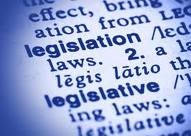Before the legislative process can begin - someone has to come up with the idea for a law. So where do laws originate?
1 Some laws are proposed by Members of Legislatures themselves. MPs, Peers, Congressmen, Senators, MEPs, Deputes & Senateurs have ideas about new laws they would like to create. In the UK time is set aside for Private Members Bills. In the United States many of the bills considered by Congress originate and are drafted by Members themselves. Today Members have staff, and they too - as part of their work, may generate ideas for legislation.
2 The Executive is often a major source of legislation. In the UK Standing Order 14 gives precedence to Government Business for most of the time available. Even some Private Members Bills are in fact bills which the Government has come up with, but have been taken up by a backbencher. In the US, the President has no right to introduce legislation himself, but a member of Congress will introduce the measure for them. Sometimetimes the member might disgree agree with the proposed legislation, but will do so as a courtesy. These may even be designated "by request".
3 Constituents may request their representative to introduce a bill.
4 As part of their representative activities, Members do 'casework'. This can highlight weaknesses in the existing law or uncover a need which is not yet being addressed. Members may propose legislation themselves or press the Executive to act by introducing draft legislation.
5 Some ideas come forward from special interests. Trade Associations, Unions, Employers' organisations will put forward ideas.
6 Think tanks can be a valuable source of ideas for new legislation.
7 There are bodies set up to review the working of existing law - and to propose law revision or reform. In the UK there is the Law Commission.
8 Some laws are the result of media pressure. One notorious example in Britain is the Dangerous Dogs Act 1991, which was rushed through with great haste in response to a media driven campaign.
9 Not all laws remain on the Statute book indefinitely. In the UK an Armed Forces Bill is required every five years in order to continue in force the provisions of the current Service legislation relating to Service discipline.
10 External events may drive the introduction of legislation. A court decision may lead the Government or a concerned member to introduce a bill to change the law in response. A disaster or a scandal may prompt legislation to avoid reeoccurence. Advances in scientific knowledge or capabilities may require action.
Throughout the world it is normal to limit the right of initiative - the right to actually introduce the piece of proposed legislation - to members of the legislature. However as the list above shows - the ideas may come from many outside sources. There are legislatures where the Government can directly introduce legislation (in the UK bills are introduced in the name of the Minister or Ministers who are members - by convention all ministers are members of either the House of Commons or the House of Lords). In the European Union, the right to initiative rests exclusively with the European Commission (for more information press here).
Monday, 22 August 2011
Where do Laws come from?
Labels:
Legislation,
Legislative Process
Location:
Milton Keynes, Buckinghamshire, UK



